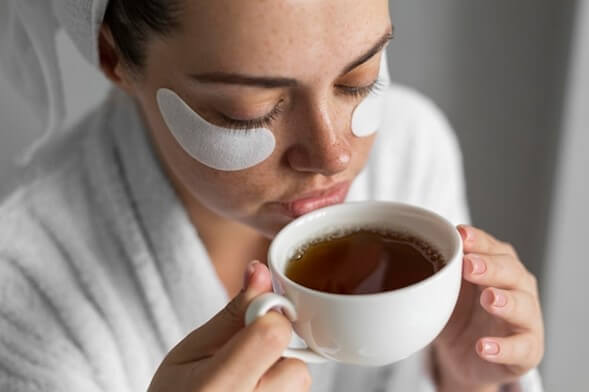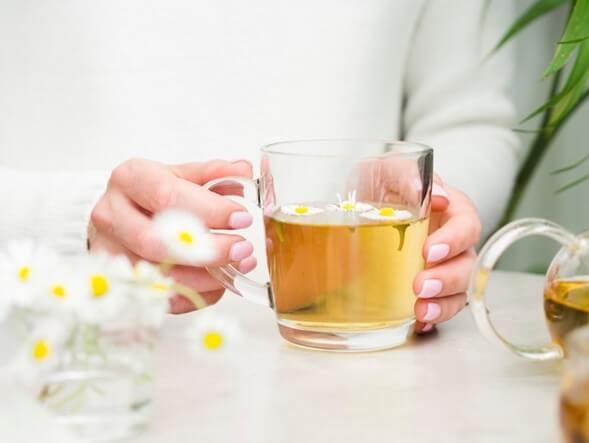Enjoying a cup of tea during the day is more than a simple pleasure to give ourselves to relax for a moment. It’s also an excellent way of incorporating into a balanced diet a source of functional ingredients that can help improve our health in more than one way. In this article, we will explore six benefits of drinking herbal teas to support women’s health and the most common ones for each purpose.
Difference between “Tea” and “Herbal Tea”

Although they may sound the same thing, tea and herbal tea do not necessarily refer to the same type of beverage.
Tea (or “true tea”) refers to the common beverage made from leaves and buds or twigs of the plant Camellia Sinensis, and it represents the second most consumed beverage in the world after water. The four major types of true teas that we can find are black tea, oolong tea, green tea, and white tea [1].
Herbal tea (also called tisane) usually refers to infusions made of fruit or other herbs that
do not contain
Camellia sinensis
. For instance, herbal teas can be made with fresh or dried flowers, immature fruits, leaves, seeds, and/or roots by steeping (infusion) or boiling (decoction) the source materials, including herbs [1]. Examples of popular herbal teas are:
- Chamomile tea
- Peppermint tea
- Lavender tea
- Ginger tea
- Hibiscus tea
- Fennel tea
- Rooibos tea
Echinacea tea
- Yerba mate
- Passiflora tea
- Cinnamon tea
- Licorice root tea
Many commonly consumed herbal teas do not contain detectable caffeine levels like true teas [1]. This difference makes herbal teas ideal for consumption at any time during the day, even at night.
Nonetheless, this article will also include true teas in the discussion of herbal teas and their potential benefits.
Benefits of Herbal Teas for Women’s Health
In general, herbal teas, when consumed within a balanced diet, may improve the antioxidant status and reduce oxidative stress [1], which supports most of the health benefits they can provide to our bodies. Some of those benefits include:
1.
Protect Skin from Photoaging Effects.

Skin photoaging is a degenerative process mediated by external factors such as ultraviolet (UV) radiation due to periodic and continuous sun exposure. UV radiation induces skin changes characterized by burning, loosening of the collagen and elastin fibers, and reduced integrity of the skin, all due to an exacerbated and UV-mediated production of reactive oxygen species (ROS) [2], that promote what is known as oxidative stress.
Our body has an internal antioxidant defense system able to fight oxidative stress. However, overexposure to free radicals and ROS can challenge our defenses, and external sources of antioxidants are needed to prevent oxidative damage [1]. Herbal teas are excellent sources of antioxidants to support this protection.
Green tea
is a potent source of exogenous antioxidants that could neutralize excess endogenous ROS inside the body, thereby diminishing the impact of photoaging. Studies suggest that green tea may increase collagen and elastin fiber content and suppress collagen-degrading enzyme MMP-3 production in the skin, conferring an anti-wrinkle effect [2].
Herbal teas such as
hibiscus, rooibos, and yerba mate
, have also been demonstrated to be important sources of antioxidant substances able to contribute positively to the reduction of oxidative stress and prevent oxidation-related stresses linked to aging [3].
NOTE: it’s important to mention that these skin protective properties are more significant and effective when skincare products formulated with these herbal teas are topically applied and that the best way to protect us from sun damage is by using sunscreen daily.
2.
Improve Sleep Quality.

Some herbal teas can ease the relaxation of the mind and promote a good night of sleep.
C
hamomile tea
is widely regarded as a mild tranquilizer and sleep-inducer. Its sedative effects may be due to several compounds able to bind to benzodiazepine and GABA receptors in the brain, modulating a sedative-hypnotic activity. Among these compounds, apigenin (a type of flavonoid) has been identified and associated with such activity [4].
Sleep quality can be a significant issue for postnatal women. In terms of supporting women’s health,
chamomile tea, and lavender tea
maybe recommended during postpartum as a complementary approach to alleviating depression and sleep quality problems [5][6].
Passiflora tea
is another popular sleep aid used to treat sleep disturbances due to its sedative action. One study suggested that the consumption of a low dose of
Passiflora incarnata
, in the form of tea, yields short-term subjective sleep benefits for healthy adults with mild fluctuations in sleep quality [7].
3.
Support Digestion and Gastroprotection.

Some herbal teas are traditionally used to alleviate gastrointestinal conditions and facilitate digestion.
Chamomile tea
is particularly popular for relieving digestive disorders and gastrointestinal irritation. It is especially helpful in dispelling gas, soothing the stomach, and relaxing the muscles that move food through the intestines [4], easing digestion.
Peppermint tea
has also been associated with an antispasmodic effect. Research has shown that peppermint tea might induce a relaxation effect on the gastrointestinal tissue [8], soothing stomach discomfort.
Ginger
has also been studied for its gastroprotective properties, supported by several studies that have reported ginger as a digestive enhancer [9].
4.
Act as Immune boosters.

Herbal teas can also be bestowed with functional ingredients with immunomodulating properties, protecting against various diseases [10].
For instance, an article reviewing Plants as Effective Immunity Mediators highlighted the importance of green
tea, ginger, echinacea,
and
licorice
as natural immune boosters, which may act by several mechanisms and pathways that eventually lead to improvement in the immune response and defense system in our body [10].
Green tea
, due to its high content of polyphenols, can enhance our antioxidant defenses, modulate detoxification enzymes, and stimulate immune function. Several studies have evidenced that polyphenols derived from tea possess bioactivity to delay the onset of risk factors associated with disease development [11].
5.
Relieve Menstrual Cramps.

As women, we know that period cramps can certainly be painful and interfere with our daily lives. In this case, you may also benefit from herbal teas made from
fennel, chamomile,
ginger, or cinnamon
during these days of the month to reduce the associated pain.
Fennel tea
is a source of a substance known as anethole, which can bind to the dopamine receptor, neutralizing oxytocin and prostaglandin-induced pain and spasms. Fennel may also induce menstrual bleeding in shorter intervals, which in turn decreases pain [12].
Chamomile
flowers
contain many compounds, including flavonoids with antispasmodic effects and bisabolol with anti-inflammatory activity. Chamomile is a plant widely known for its analgesic effects, but it may also increase menstrual blood flow, delivering therapeutic effects to treat menstrual pain [12].
Ginger
It is also useful in minimizing menstrual cramps and relaxing muscular spasms. Studies have attested to the efficacy of ginger in treating menstrual pain, considering it as effective as conventional anti-inflammatory drugs [13]. The same is true for
cinnamon
, which has additionally been shown to reduce pain intensity and shorten its duration [14].
Risks and Safety Considerations
Although the consumption of herbal teas is believed to be safe, it’s important to consider the following aspects:
- Always prepare and consume herbal teas at the
recommended dose
to avoid potential adverse effects. They are safe when consumed in moderation: 2 to 3 cups daily is more than ok. - If you are taking any
medication
, always notify your doctor of the herbal teas that you are concomitantly consuming.
Why?
Some herbal teas can change how your medicine behaves and metabolizes in your body, creating interactions that can affect the efficacy and safety of drugs (your medicine can stop working or become toxic). - If you are
pregnant
Always consult your doctor about whether you can consume a certain type of herbal tea and how many cups per day are advised.
· Herbal teas are not a replacement for pharmacological therapies. If you have a
health-related problem
, we advise you to
seek medical assistance
. Herbal teas aim to support health rather than cure a disease.
THE TAKEAWAY
If you are looking for alternatives to enhance your health in different aspects, adding herbal teas to your daily diet can indeed be beneficial. Whether you want to relax and prepare for a good night of sleep, alleviate discomforts, or boost your overall health and defenses, there is always an herbal tea option to fit your needs. Nonetheless, keep in mind that herbal teas are intended to support your overall health and well-being and they should never be intended to treat or cure any disease.
REFERENCES
[1] Chandrasekara, A., & Shahidi, F. (2018). Herbal beverages: Bioactive compounds and their role in disease risk reduction – A review. Journal of Traditional and Complementary Medicine, 8 (4), 451–458. https://doi.org/10.1016/j.jtcme.2017.08.006
[2] Prasanth, M. I., Sanlier, N., Chaiyasut, C., & Tencomnao, T. (2019). A Review of the Role of Green Tea (Camellia sinensis) in Antiphotoaging, Stress Resistance, Neuroprotection, and Autophagy. Nutrients, 11 (2), 474. https://doi.org/10.3390/nu11020474
[3] Lima, M. P., Boulanger, E., Tessier, F. J., & Takahashi, J. A. (2022). Hibiscus, Rooibos, and Yerba Mate for Healthy Aging: A Review on the Attenuation of In Vitro and In Vivo Markers Related to Oxidative Stress, Glycoxidation, and Neurodegeneration. Foods, 11 (12), 1676. https://doi.org/10.3390/foods11121676
[4] Srivastava, J. K., Shankar, E., & Gupta, S. (2010). Chamomile: A herbal medicine of the past with a bright future (Review). Molecular Medicine Reports, 3 (6). https://doi.org/10.3892/mmr.2010.377
[5] Chang, S., & Chen, C. H. (2016). Effects of an intervention with drinking chamomile tea on sleep quality and depression in sleep disturbed postnatal women: a randomized controlled trial. Journal of Advanced Nursing, 72 (2), 306–315. https://doi.org/10.1111/jan.12836
[6] Poswal, F. S., Russell, G., Mackonochie, M., MacLennan, E., Adukwu, E., & Rolfe, V. E. (2019). Herbal Teas and their Health Benefits: A Scoping Review. Plant Foods for Human Nutrition, 74 (3), 266–276. https://doi.org/10.1007/s11130-019-00750-w
[7] Ngan, A., & Conduit, R. (2011). A Double-blind, Placebo-controlled Investigation of the Effects of Passiflora Incarnata (Passionflower) Herbal Tea on Subjective Sleep Quality. Phytotherapy Research, 25 (8), 1153–1159. https://doi.org/10.1002/ptr.3400
[8] McKay, D. L., & Blumberg, J. B. (2006). A review of the bioactivity and potential health benefits of peppermint tea (Mentha piperita L.). Phytotherapy Research, 20 (8), 619–633. https://doi.org/10.1002/ptr.1936
[9] Anh, N. D. Q., Kim, S. Y., Long, N. T., Min, J. J., Yoon, Y. S., Lee, E., Kim, M., Kim, T., Yang, Y. J., Son, E., Yoon, S. M., Chi, N. T. D., Kim, H., & Kwon, S. W. (2020). Ginger on Human Health: A Comprehensive Systematic Review of 109 Randomized Controlled Trials. Nutrients, 12 (1), 157. https://doi.org/10.3390/nu12010157
[10] Ahmed, M. M., Butt, M. S., Qayyum, M. M. N., & Suleria, H. a. R. (2014). Immunity: Plants as Effective Mediators. Critical Reviews in Food Science and Nutrition, 54 (10), 1298–1308. https://doi.org/10.1080/10408398.2011.633249
[11] Serafini, M. (2011). Health Benefits of Tea. Herbal Medicine – NCBI Bookshelf. https://www.ncbi.nlm.nih.gov/books/NBK92768/
[12] Sharghi, M., Mansurkhani, S. M., Larky, D. A., Kooti, W., Niksefat, M., Firoozbakht, M., Behzadifar, M., Azami, M., Servatyari, K., & Jouybari, L. (2019). An update and systematic review on the treatment of primary dysmenorrhea. JBRA Assisted Reproduction. https://doi.org/10.5935/1518-0557.20180083
[13] Negi, R., Sharma, S. K., Gaur, R., Bahadur, A., & Jelly, P. (2021). Efficacy of Ginger in the Treatment of Primary Dysmenorrhea: A Systematic Review and Meta-analysis. Cureus. https://doi.org/10.7759/cureus.13743
[14] Xu, Y., Yang, Q., & Wang, X. (2020). Efficacy of herbal medicine (cinnamon/fennel/ginger) for primary dysmenorrhea: a systematic review and meta-analysis of randomized controlled trials. Journal of International Medical Research, 48 (6), 030006052093617. https://doi.org/10.1177/0300060520936179

 By myulikeadmin
By myulikeadmin



